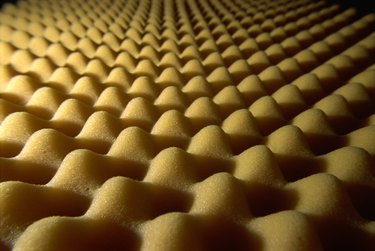Things You’ll Need
-
Blankets
-
Sheets
-
Egg cartons
-
Duct tape
-
Newspapers
-
Cotton batting
-
Egg crate foam
-
Staple gun
-
Hammer
-
Nails
-
Push pins
-
Scissors
 Try the egg crate foam from your mattress as sound-proofing material. Image Credit: Dynamic Graphics Group/Dynamic Graphics Group/Getty Images
Try the egg crate foam from your mattress as sound-proofing material. Image Credit: Dynamic Graphics Group/Dynamic Graphics Group/Getty Images
Sound-absorbing foam is meant to reduce reverberation and echoing in areas such as a music studio, gymnasium, auditoriums or home theaters. This foam is usually installed in panels and can be purchased through a variety of manufacturers or stores, but the material can be expensive. Using materials from around the house can be a cheaper alternative, and while home items are less likely to be as effective as acoustic-absorbing tiles or foam, home items can be a possible substitute.
Step 1
Hang up large padding items for large surface areas such as a ceiling or wall using a staple gun or hammer and nails. Possible sound-absorbing items include blankets or sheets. Note that the thicker the material, the more effective the material will be at absorbing sound and echoes.
Step 2
Wipe out any remaining food debris from empty egg cartons made out of Styrofoam or cardboard. Fill the empty cartons with newspaper or cotton batting to increase sound absorption and secure the additional material with painter's or duct tape. Hang the cartons on the desired area with the interior of the egg cartons placed against the surface and attach them with a staple gun or hammer and nails.
Step 3
Cut mattress egg crate foam pads to the desired size with a pair of heavy scissors. Note that you will need large push pins or a staple gun to secure the egg crate foam, as nails may cause the foam to rip, especially if you're hanging the material on ceilings or walls.
Tip
Try creating layers of different home items, such as blankets underneath egg crate foam or egg cartons, to help increase the sound absorbency.


